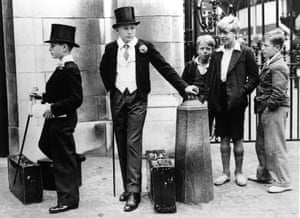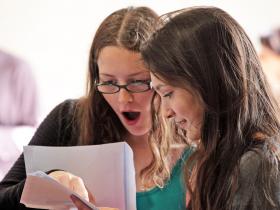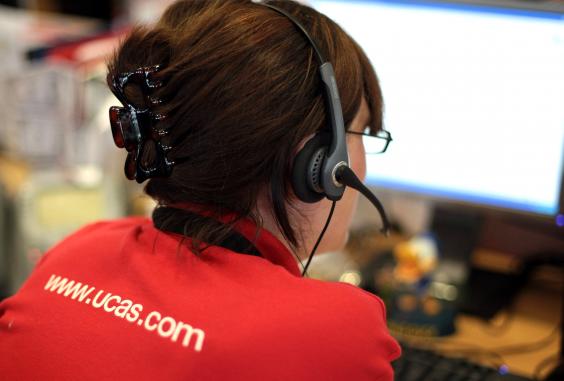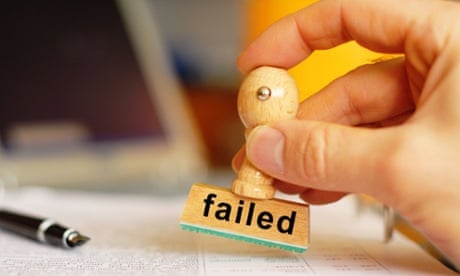
A-level results day at Rochdale sixth form a year ago. This year, experts say, students will have much more power to negotiate their university places. Photograph: Gary Calton/The Observer
School leavers may feel that, with A-level exams cancelled, they have lost control over their future. But experts say they have never had more power to talk their way into their first-choice university, even if they miss their grades.
As sixth-formers nervously await next month’s teacher-assessed results from the exams regulator, Ofqual, research by the Institute for Fiscal Studies has found that in the aftermath of coronavirus, the UK higher education sector is facing losses of between £3bn and £19bn in the new academic year, depending on how many students enrol.
Many universities expect to lose 50-100% of their lucrative international student intake, a blow that will hit the most selective institutions hardest. While they have agreed to a government cap on student numbers to maintain stability, it was set with enough room for successful universities to increase UK student numbers to make up some of the shortfall.
Nick Hillman, director of the Higher Education Policy Institute thinktank, says: “The way they are grading A-levels this year gives [young people] much more room to negotiate. You can easily ring and make a case for being let in based on your grades being wrong.”
He says that if universities have lots of empty seats this year they will be “in compulsory redundancy territory”.
Simon Marginson, professor of higher education at Oxford University, agrees school leavers have “an unusual level of power this time”. In ordinary years universities, particularly the elite ones, have been wary of letting in too many applicants with lower grades for fear it could affect their position in the all-important league tables.
Marginson predicts this year could be different. “No one loses competitive position if everyone shifts the same way at the same time, as seems likely. The name of the game is organisational survival and everyone knows that.”
However, many academics are concerned that more disadvantaged candidates might be less likely to negotiate offers and hunt down good places in clearing.
Barnaby Lenon, former head of Harrow public school and chair of the Independent Schools Council, has urged university admission authorities to look beyond “dodgy” A-level grades, which “could be wrong”, when deciding who to admit.
Everyone has heard tales of middle-class parents picking up the phone to Oxford or Cambridge to argue for their child’s place. Lee Elliot Major, professor of social mobility at the University of Exeter, says: “Never underestimate the adeptness of the sharp-elbowed middle classes at exploiting opportunities. And no opportunity is more prized than a place at a prestigious university.”
Elliot Major worries that next month’s frantic last-minute market for places may further skew the playing field against poorer young people. “There is a genuine fear that many disadvantaged pupils who would have excelled in their A-levels this year will be penalised with lower scores by the system of calculated grades, which estimates grades on the basis of historical averages of schools,” he says.
Some believe Ucas, the admissions service, is not helping. Mark Corver, former director of analysis and research at Ucas and now founder of dataHE consultancy, has warned the government there is not enough detailed data publicly available to allow students and teachers to prove if the Ofqual grading process has gone wrong for them.
“We’ve asked Ucas repeatedly to release some simple tables showing the typical exam grades that applicants with different predicted grades get in a normal year. They have steadfastly refused,” he says. “We’ve found them reluctant and obstructive. Given they are a charity and not a commercial organisation, it’s very disappointing.”
However, Richard O’Kelly, head of analytical data at Ucas, denies the organisation is being obstructive. He says it cannot publish the data set, which breaks down results by factors including gender, ethnicity and social background, because it creates an “unacceptable risk” of individual applicants being identifiable. He adds: “We have published more data during this year than ever before to promote confidence amongst students and universities.”
Sophie Hatton, an 18-year-old school leaver from Birmingham, says she is feeling “increasingly anxious” waiting for her A-level grades. “At first I thought it was great having all my exams cancelled. Then it hit me how terrifying it is that two years of work could account for nothing as I have no full way of showing my potential.”
Hatton is hoping to study sociology at Nottingham Trent University, but she says that if she doesn’t get the grades she needs she will get on the phone and try to negotiate, “to prove I am a determined, hard-working student”.
Kate Spalding, another 18-year-old waiting for her results, in Southampton, says she was upset for days after hearing she could not sit her exams: “I felt all my work had gone to waste.” Now, she says, she has decided to trust her teachers and is feeling more confident.
She is planning a gap year, but if she does not get the grades she needs to study drama at Manchester or Leeds, she intends to retake her A-levels later in the year.
Despite the government’s cap on student numbers this year, with financial penalties for those that exceed it, many selective institutions are planning for expansion, within the boundary of an extra 5% on last year’s enrolment forecasts.
Prof Colin Riordan, vice-chancellor of Cardiff University, a member of the Russell Group, says his university is anticipating a 2% growth in UK student numbers this year. “Given the way the cap has been set, it is conceivable that quite a few selective universities will take marginally more students than last year, and altogether that could be quite a lot,” he says.
Yet Riordan admits that for institutions such as his, international students and not UK ones make the real financial difference – and their numbers will be unclear until October or November. “Really we won’t know how many international students we will get until they actually turn up – or don’t,” he says.
Vice-chancellors say the way A-levels are being calculated this year is making them nervous. Another Russell Group head, who asked not to be named, says: “We have thousands of students who have put us as first choice and accepted our offer. Usually we can be pretty accurate on what percentage will achieve the grades. But this year if there is even 10% inflation on that, that’s a big difference.”
The government has confirmed, in new guidance issued earlier this month, that it will not penalise universities for going over their cap because a larger number of students than expected meet their offer grades. But the vice-chancellor says that, in a Covid-19 world, a big increase would put pressure on facilities. “There are two nightmares: one where no one turns up, and one where everyone turns up while we are trying to do social distancing,” he says.
If prestigious institutions expand, they could suck up some students who might have chosen mid-ranking universities, leaving some of those institutions without enough undergraduates – and their £9,250 a year fees. Marginson says this would leave universities at the bottom of the sector “facing very difficult times”.
Dean Machin, head of policy at the University of Portsmouth, agrees. “We have potentially got the worst of both worlds. For sector stability we enabled government to control the number of people who go to university – and unfortunately it is unlikely to provide all universities the protection they were seeking.”
The Office for Students regulator is consulting on new powers to intervene faster to protect students in case any universities or colleges are at risk of closure.
School leavers may feel that, with A-level exams cancelled, they have lost control over their future. But experts say they have never had more power to talk their way into their first-choice university, even if they miss their grades.
As sixth-formers nervously await next month’s teacher-assessed results from the exams regulator, Ofqual, research by the Institute for Fiscal Studies has found that in the aftermath of coronavirus, the UK higher education sector is facing losses of between £3bn and £19bn in the new academic year, depending on how many students enrol.
Many universities expect to lose 50-100% of their lucrative international student intake, a blow that will hit the most selective institutions hardest. While they have agreed to a government cap on student numbers to maintain stability, it was set with enough room for successful universities to increase UK student numbers to make up some of the shortfall.
Nick Hillman, director of the Higher Education Policy Institute thinktank, says: “The way they are grading A-levels this year gives [young people] much more room to negotiate. You can easily ring and make a case for being let in based on your grades being wrong.”
He says that if universities have lots of empty seats this year they will be “in compulsory redundancy territory”.
Simon Marginson, professor of higher education at Oxford University, agrees school leavers have “an unusual level of power this time”. In ordinary years universities, particularly the elite ones, have been wary of letting in too many applicants with lower grades for fear it could affect their position in the all-important league tables.
Marginson predicts this year could be different. “No one loses competitive position if everyone shifts the same way at the same time, as seems likely. The name of the game is organisational survival and everyone knows that.”
However, many academics are concerned that more disadvantaged candidates might be less likely to negotiate offers and hunt down good places in clearing.
Barnaby Lenon, former head of Harrow public school and chair of the Independent Schools Council, has urged university admission authorities to look beyond “dodgy” A-level grades, which “could be wrong”, when deciding who to admit.
Everyone has heard tales of middle-class parents picking up the phone to Oxford or Cambridge to argue for their child’s place. Lee Elliot Major, professor of social mobility at the University of Exeter, says: “Never underestimate the adeptness of the sharp-elbowed middle classes at exploiting opportunities. And no opportunity is more prized than a place at a prestigious university.”
Elliot Major worries that next month’s frantic last-minute market for places may further skew the playing field against poorer young people. “There is a genuine fear that many disadvantaged pupils who would have excelled in their A-levels this year will be penalised with lower scores by the system of calculated grades, which estimates grades on the basis of historical averages of schools,” he says.
Some believe Ucas, the admissions service, is not helping. Mark Corver, former director of analysis and research at Ucas and now founder of dataHE consultancy, has warned the government there is not enough detailed data publicly available to allow students and teachers to prove if the Ofqual grading process has gone wrong for them.
“We’ve asked Ucas repeatedly to release some simple tables showing the typical exam grades that applicants with different predicted grades get in a normal year. They have steadfastly refused,” he says. “We’ve found them reluctant and obstructive. Given they are a charity and not a commercial organisation, it’s very disappointing.”
However, Richard O’Kelly, head of analytical data at Ucas, denies the organisation is being obstructive. He says it cannot publish the data set, which breaks down results by factors including gender, ethnicity and social background, because it creates an “unacceptable risk” of individual applicants being identifiable. He adds: “We have published more data during this year than ever before to promote confidence amongst students and universities.”
Sophie Hatton, an 18-year-old school leaver from Birmingham, says she is feeling “increasingly anxious” waiting for her A-level grades. “At first I thought it was great having all my exams cancelled. Then it hit me how terrifying it is that two years of work could account for nothing as I have no full way of showing my potential.”
Hatton is hoping to study sociology at Nottingham Trent University, but she says that if she doesn’t get the grades she needs she will get on the phone and try to negotiate, “to prove I am a determined, hard-working student”.
Kate Spalding, another 18-year-old waiting for her results, in Southampton, says she was upset for days after hearing she could not sit her exams: “I felt all my work had gone to waste.” Now, she says, she has decided to trust her teachers and is feeling more confident.
She is planning a gap year, but if she does not get the grades she needs to study drama at Manchester or Leeds, she intends to retake her A-levels later in the year.
Despite the government’s cap on student numbers this year, with financial penalties for those that exceed it, many selective institutions are planning for expansion, within the boundary of an extra 5% on last year’s enrolment forecasts.
Prof Colin Riordan, vice-chancellor of Cardiff University, a member of the Russell Group, says his university is anticipating a 2% growth in UK student numbers this year. “Given the way the cap has been set, it is conceivable that quite a few selective universities will take marginally more students than last year, and altogether that could be quite a lot,” he says.
Yet Riordan admits that for institutions such as his, international students and not UK ones make the real financial difference – and their numbers will be unclear until October or November. “Really we won’t know how many international students we will get until they actually turn up – or don’t,” he says.
Vice-chancellors say the way A-levels are being calculated this year is making them nervous. Another Russell Group head, who asked not to be named, says: “We have thousands of students who have put us as first choice and accepted our offer. Usually we can be pretty accurate on what percentage will achieve the grades. But this year if there is even 10% inflation on that, that’s a big difference.”
The government has confirmed, in new guidance issued earlier this month, that it will not penalise universities for going over their cap because a larger number of students than expected meet their offer grades. But the vice-chancellor says that, in a Covid-19 world, a big increase would put pressure on facilities. “There are two nightmares: one where no one turns up, and one where everyone turns up while we are trying to do social distancing,” he says.
If prestigious institutions expand, they could suck up some students who might have chosen mid-ranking universities, leaving some of those institutions without enough undergraduates – and their £9,250 a year fees. Marginson says this would leave universities at the bottom of the sector “facing very difficult times”.
Dean Machin, head of policy at the University of Portsmouth, agrees. “We have potentially got the worst of both worlds. For sector stability we enabled government to control the number of people who go to university – and unfortunately it is unlikely to provide all universities the protection they were seeking.”
The Office for Students regulator is consulting on new powers to intervene faster to protect students in case any universities or colleges are at risk of closure.











